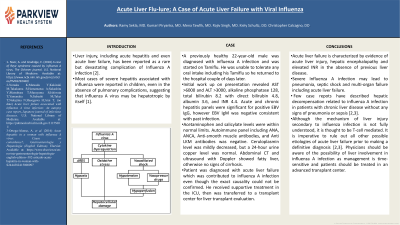Monday Poster Session
Category: Liver
P2554 - Acute Liver Flu-lure: A Case of Acute Liver Failure With Viral Influenza
Monday, October 23, 2023
10:30 AM - 4:15 PM PT
Location: Exhibit Hall

Has Audio

Kumari Piryanka, MD
Parkview Medical Center
Pueblo, Colorado
Presenting Author(s)
Ramy Sekla, MD, Kumari Piryanka, MD, Mena Tawfik, MD, Rajiv Singh, MD, Kiely Schultz, DO, Christopher Calcagno, DO
Parkview Medical Center, Pueblo, CO
Introduction: Liver injury, such as acute hepatitis and acute liver failure, has been reported as a rare but devastating complication of Influenza A infection. Most cases of Influenza-related severe hepatitis were reported in children, even in the absence of pulmonary complications, suggesting that influenza A virus may be hepatotropic.
Case Description/Methods: A previously healthy 22-year-old male was diagnosed with influenza A and was started on Tamiflu. He presented to the hospital 3 days later with right upper quadrant abdominal pain and intractable vomiting. He was unable to tolerate any oral intake including Tamiflu. He was slightly altered on admission, otherwise hemodynamically stable. He denied alcohol use or history of liver disease. Initial work up revealed AST >6000, ALT >3000, alkaline phosphatase 128, total bilirubin 8.2 with direct bilirubin 4.8, albumin 3.6, and INR 4.4. Acute and chronic hepatitis panels showed positive EBV IgG, however EBV IgM was negative consistent with past infection. Acetaminophen and salicylate levels were normal. Autoimmune panel including ANA, ANCA, ASMA, and Anti-LKM antibodies was negative. Ceruloplasmin level was mildly decreased, but a 24-hour urine copper level was normal. Abdominal CT and ultrasound with Doppler showed fatty liver, otherwise no signs of cirrhosis. Even though the exact causality could not be confirmed, patient was diagnosed with influenza-related acute liver failure. He received supportive treatment in the ICU, then was transferred to a transplant center for further evaluation.
Discussion: Acute liver failure is characterized by evidence of acute liver injury, hepatic encephalopathy and elevated INR in the absence of previous liver disease. Early diagnosis is crucial as the prognosis is very poor if left untreated. Severe Influenza A infection may lead to pneumonia, septic shock and multi-organ failure including acute liver failure. Few case repots have described hepatic decompensation related to influenza A infection in patients with chronic liver disease without any signs of pneumonia or sepsis. Although the mechanism of liver injury secondary to influenza infection is not fully understood, it is thought to be T-cell mediated. It is imperative to rule out all other possible etiologies of acute liver failure prior to making a definitive diagnosis. Physicians should be aware of the possibility of liver involvement in influenza A infection as management is time-sensitive and patients should be treated in an advanced transplant center.
Disclosures:
Ramy Sekla, MD, Kumari Piryanka, MD, Mena Tawfik, MD, Rajiv Singh, MD, Kiely Schultz, DO, Christopher Calcagno, DO. P2554 - Acute Liver Flu-lure: A Case of Acute Liver Failure With Viral Influenza, ACG 2023 Annual Scientific Meeting Abstracts. Vancouver, BC, Canada: American College of Gastroenterology.
Parkview Medical Center, Pueblo, CO
Introduction: Liver injury, such as acute hepatitis and acute liver failure, has been reported as a rare but devastating complication of Influenza A infection. Most cases of Influenza-related severe hepatitis were reported in children, even in the absence of pulmonary complications, suggesting that influenza A virus may be hepatotropic.
Case Description/Methods: A previously healthy 22-year-old male was diagnosed with influenza A and was started on Tamiflu. He presented to the hospital 3 days later with right upper quadrant abdominal pain and intractable vomiting. He was unable to tolerate any oral intake including Tamiflu. He was slightly altered on admission, otherwise hemodynamically stable. He denied alcohol use or history of liver disease. Initial work up revealed AST >6000, ALT >3000, alkaline phosphatase 128, total bilirubin 8.2 with direct bilirubin 4.8, albumin 3.6, and INR 4.4. Acute and chronic hepatitis panels showed positive EBV IgG, however EBV IgM was negative consistent with past infection. Acetaminophen and salicylate levels were normal. Autoimmune panel including ANA, ANCA, ASMA, and Anti-LKM antibodies was negative. Ceruloplasmin level was mildly decreased, but a 24-hour urine copper level was normal. Abdominal CT and ultrasound with Doppler showed fatty liver, otherwise no signs of cirrhosis. Even though the exact causality could not be confirmed, patient was diagnosed with influenza-related acute liver failure. He received supportive treatment in the ICU, then was transferred to a transplant center for further evaluation.
Discussion: Acute liver failure is characterized by evidence of acute liver injury, hepatic encephalopathy and elevated INR in the absence of previous liver disease. Early diagnosis is crucial as the prognosis is very poor if left untreated. Severe Influenza A infection may lead to pneumonia, septic shock and multi-organ failure including acute liver failure. Few case repots have described hepatic decompensation related to influenza A infection in patients with chronic liver disease without any signs of pneumonia or sepsis. Although the mechanism of liver injury secondary to influenza infection is not fully understood, it is thought to be T-cell mediated. It is imperative to rule out all other possible etiologies of acute liver failure prior to making a definitive diagnosis. Physicians should be aware of the possibility of liver involvement in influenza A infection as management is time-sensitive and patients should be treated in an advanced transplant center.
Disclosures:
Ramy Sekla indicated no relevant financial relationships.
Kumari Piryanka indicated no relevant financial relationships.
Mena Tawfik indicated no relevant financial relationships.
Rajiv Singh indicated no relevant financial relationships.
Kiely Schultz indicated no relevant financial relationships.
Christopher Calcagno indicated no relevant financial relationships.
Ramy Sekla, MD, Kumari Piryanka, MD, Mena Tawfik, MD, Rajiv Singh, MD, Kiely Schultz, DO, Christopher Calcagno, DO. P2554 - Acute Liver Flu-lure: A Case of Acute Liver Failure With Viral Influenza, ACG 2023 Annual Scientific Meeting Abstracts. Vancouver, BC, Canada: American College of Gastroenterology.
